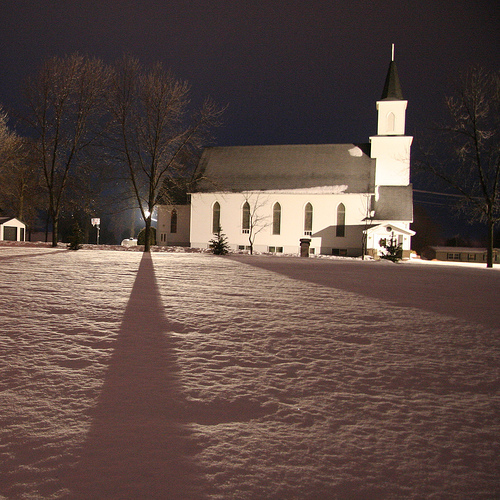We run our website the way we wished the whole internet worked: we provide high quality original content with no ads. We are funded solely by your direct support. Please consider supporting this project.
Don’t Be a Functional Atheist at Christmas
All of us raised in Western culture have been strongly conditioned by what is called a secular worldview. The word secular comes from the Latin saeculum, meaning “the present world.” A secular worldview, therefore, is one that focuses on the present physical world and ignores or rejects the spiritual realm. To the extent that one is secularized, spiritual realities like God, angels, demons, and heaven don’t have a significant role in one’s thought or life.
Of course many of us continue to believe in things like God, Jesus, angels, demons, heaven, and hell. But as every study on the topic has shown, our beliefs tend to have little impact on our lives. The majority of Western people hold some sort of spiritual beliefs, but nonetheless continue to live much of their lives as functional atheists.
Let’s be honest. Most of us don’t think about God in most of our waking moments. Still fewer consciously surrender to God in most of our waking moments. Even fewer experience God’s presence in most of our waking moments. Our day-to-day lives are, for all intents and purposes, God-less.
This is the tragic affliction of secularism.
The Gospels tell us that the birth of Jesus is all about the presence of God. His name is “Immanuel” which means God with us. The Incarnation of God introduced the Kingdom of God as Jesus perfectly manifested the reign of God. Jesus did this through unbroken communion with the Father. He never did or said anything except what he saw and heard the Father do. His life was an unbroken act of obedient surrender to the Father’s will. In other words, he lived out the absolute antithesis of a life lived according to the secular worldview. Instead of thinking, living, and experiencing reality on a moment-by-moment basis as though God does not exist, Jesus thought, lived, and experienced the world as though it is continually permeated with God’s presence—because, as a matter of fact, it is.
You are, right now, enveloped by God’s loving presence like a molecule of water in the middle of an infinite ocean. His loving presence presses in on you like the water pressure on a submarine three miles beneath the ocean. Right now, simply become aware of this truth. Let the reality of God’s loving presence be a canvas against which you experience and interpret the world around you.
The most insignificant details of our life take on eternal significance when they are integrated with an awareness of God’s continual presence. In God’s presence, the “secular” world disappears as it is enveloped by, and permeated with, the “holy.”
As I’ve practiced the presence of God, (I write about this in my book Present Perfect) there have been moments when I’ve suddenly become aware of the beautiful mystery of every detail of my surroundings. It’s like the Kingdom breaks through my habitual, false, “secular” view of the world and explodes it from the inside out. In these moments I sense the mind-boggling miracle of existence in everything around me. A leaf twitching in the wind; a bird flying overhead; a ladybug on a blade of grass—it’s all unfathomable miracle. In these moments I am tangibly aware that all things are at every moment held in existence by “[God’s] powerful word” (Heb 1:3). I am struck with childlike wonder. I feel like I’m looking at the world for the first time.
Don’t let the secularized worldview of functional atheism dull your senses. Surrender to his love. Acknowledge his presence around you. Pay attention to the nudges in your heart. God is present.
—Adapted from The Myth of a Christian Religion, pages 163-170.
Related Reading

Penal Substitution View of Atonement: Did God the Father Just Need to Vent?
In this video blog, Greg outlines the penal substitution view of atonement which says that the Father poured out his wrath on Jesus instead of us so that we could be forgiven. This view is very common and you might even be nodding your head in agreement with that description. However, this view creates some…

Violence: What Did Jesus Do?
Thomas Quine via Compfight Here’s a spot-on reflection on what Jesus taught us about responding to violence. Whatever you think about the justification of violence in particular situations, as Christians we simply cannot escape the fact that Jesus demonstrated another way. From the reflection: And though he had access to unlimited power to have himself released…

God’s Goal for the World
Helga Weber via Compfight In a world that is all about doom and gloom… In a time when we never seem to have enough… In the midst of messages that tell us that we don’t measure up… In an age when we are more interested in whether or not we can own automatic weapons than…

The Cruciform Center Part 4: How Revelation Reveals a Cruciform God
I’ve been arguing that, while everything Jesus did and taught revealed God, the character of the God he reveals is most perfectly expressed by his loving sacrifice on the cross. Our theology and our reading of Scripture should therefore not merely be “Christocentric”: it should be “crucicentric.” My claim, which I will attempt to demonstrate…

Wake Up to God’s Presence
Jesus taught us to “remain” in him. We read this in John 15:4-5: Remain in me, as I also remain in you. No branch can bear fruit by itself; it must remain in the vine. Neither can you bear fruit unless you remain in me. “I am the vine; you are the branches. If you…

Christmas is Subversive…
…at least the first Christmas was. When Jesus came it was about the birth of a subversive ruler who brought a subversive kingdom. He is a king that came to introduce a reign that would overthrow the world. Click here for a brief reflection by Greg on Subversive Christmas, brought to you by Nomad.

